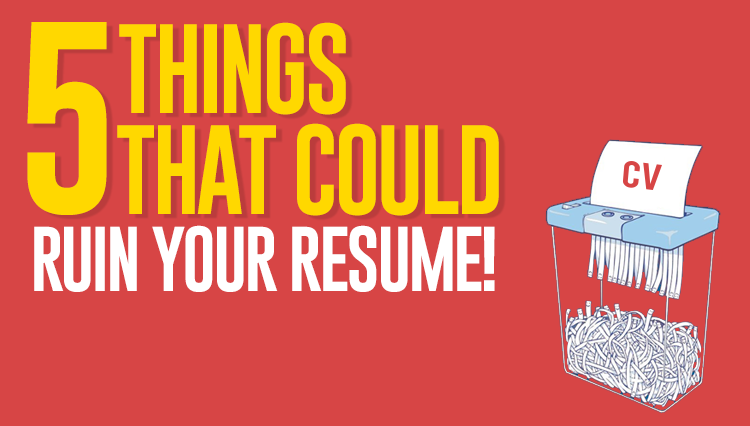When creating a resume, it is important to remember that first impressions matter. After all, your intention is to present yourself in a uniquely credible and professional light so that hiring managers consider picking you for a job opening. That being said, there could be certain entries on resumes and CV’s that strike out as red flags to anyone reading them.
We have made a list of things that you should consider keeping to yourself while writing your resume. These include:
Listing Your Age

When you apply for a job opening, your potential employers are interested in the value you can bring to the organization. What they are not interested in knowing is the amount of years that you have managed to stay alive. Listing your age (or year of birth) on your resume is just a waste of space that could be used to share information that companies are actually interested in learning about.
Avoiding to do so would also keep you away from being discriminated for your age – being too young or too old in the eyes of employers may work against you as without being able to judge your professional worth in person, they would most likely base their assumptions on the information you have provided to them on paper.
Unprofessional Contact Information

We all know someone who is still using that hilariously embarrassing email address from their high school days. When applying for a job, you should resort to using the most simple email id you can come up with. Ideally, you would want to use a format such as <[email protected]>.
Another thing to keep in mind is that you should refrain from using services that are less well-known for everyday use. Gmail and Outlook are two common email services that are used globally – you would want to stick to these instead of your iCloud account.
If (for some reason) you don’t already have an email address that meets this criteria, you can always create a new account – It’s free and it only takes a moment to set up! Your effort will pay off, after all, would you take an email from someone such as [email protected] seriously?
Also Read: How Lying on Your Resume Could Sky-Rocket Your Career!
Irrelevant Jobs and Tasks

When listing your experiences, focus on the ones that are most relevant to the position you are applying for. That internship program at a bank is probably not going to do you much favors if you’re applying for an IT related job.
Hence, it is better to list experiences that match the designation you are attempting to acquire – customizing your resume for specific jobs doesn’t go unnoticed, and hiring managers can easily detect a well-made, personalized resume intended for their organization from a generic “jack of all trades” one.
Generalized Skill Set

Just because you are good at something doesn’t mean you have to showcase it. When stating your skills and abilities, you would want to distinguish yourself from the rest of the competition, This means that you should be highlighting anything that could make you a unique asset for the organization. Skills that are basic in nature tend to be repetitive among multiple applicants – meaning that the skill in question is something that most of the people are already good at. This would tend to take the spotlight away from your otherwise attractive list of offerings.
Perhaps the entry guilty of being observed most frequently within this section would have to be “Proficient in Microsoft Office” – anyone who knows how to create and edit Word documents feels that they can enlist it as a skill. The point is to show how unique you are, not that you have the maximum number of skills (that anyone else would possess as well).
Hobbies and Interests

This section often makes it through to a vast majority of resumes. While it is not always a bad idea to share what makes you stand out in terms of personal interests, hiring managers are more keen in knowing if these hobbies would be beneficial towards your professional growth or not. Playing Chess, for instance, could be reflective of your ability to make strategic decisions. Bodybuilding however, is something that should be left for observation only.
You should keep in mind that interests are subjective, and you will never be certain as to how different people will react when going through them. It is best to avoid this section altogether, and using this space to develop a more concise picture of your professional profile/
Some Other Things To Avoid
References
You can provide your current and past job references separately, should the need arise. There is no need to waste and precious space on your resume for something that does not belong there.
Attention Seeking Tactics
These include (but are not limited to) using fancy font styles, using colored typography, applying stylish borders and adding any sort of graphics, pictures or charts.
Stating Work Experience Older Than 15 Years
This one is for the seasoned job seekers out there – you would want to look relevant in the eyes of employers. Stating jobs that you did over a decade ago would most likely not go in your favor. Keep your offerings fresh and up-to-date!





